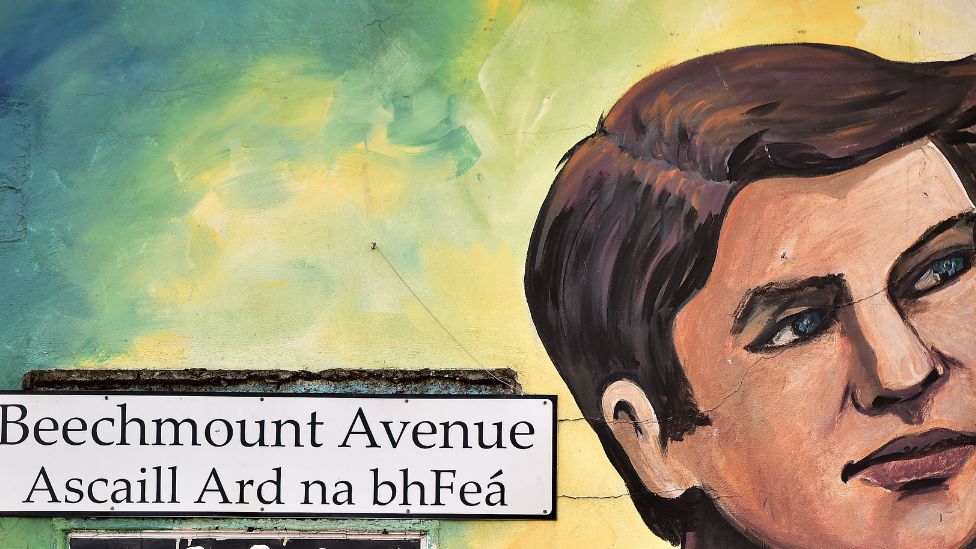Irish language: Row erupts over Belfast street signs
- Published

A row has erupted between Belfast City councillors over a decision on dual language streets signs in the west Belfast Gaeltacht Quarter.
A committee has approved the blanket installation of more than 300 Irish-language street signs at a cost of up to £170,000.
The DUP's Ian McLaughlin claimed that, for some, the Irish language is associated with Troubles-era killings.
SDLP councillor Carl Whyte said his argument was "beneath contempt".
Elected representatives voted in favour of a report's recommendations to install the signs by 15 votes to five.
All unionist councillors in the chamber voted against the move.
'Traumatised by the Irish language'
At the latest committee meeting, Mr McLaughlin told the chamber that he was uncomfortable with the agreed boundaries for the signage.
"I certainly had no role to play in that, I would never have agreed to it, and I don't understand who did, or when they did," he said.
"There are people, with the greatest respect, who want the Irish language, and quite rightly so. But in my constituency, which has quite a few interface barriers still in place, they do not."
Mr McLaughlin said some people are "traumatised" by the mention of Irish language.
"There are a lot of people whose single interaction with the Irish language was very poor. It was usually when the murderer or terrorist that murdered their loved one used to scream and squeal the famous words 'tiocfaidh ár lá' (our day will come) - whatever it was - as they left the scene of their horrendous crime.
"I don't care if it upsets anybody or not... nothing that you propose eases the fears of those people who do not want any interaction whatsoever with the Irish language."
Acknowledging that some may interpret his concerns as "anti-Irish", Mr McLaughlin proposed a "neutral zone" for interface areas,
"It might only be a couple of metres on a road, but it means a lot to people who live in these interface areas. We will do immense damage with this process if we don't try to alleviate the fears of people who live here.
"For example, Lanark Way in my community. The proposal is for one half of Lanark Way to have signage and the other half not to. The residents on Lanark Way who live closest to Shankill Road haven't been asked their opinion on this. I don't know whether the business community on the Springfield Road has," he added.
But Carl Whyte described McLoughlin's argument as "beneath contempt".
"There are other victims in this room, who wouldn't dare to suggest any objection or reluctance to the English language because acts carried out against them or their families were carried out while an English phrase was spoken or used by that organisation," the SDLP councillor said.
To move from a debate about street signs to "casting up incidents that may or may not have happened" was "an insult to people who speak and love" the Irish language, he added.
"This [argument] is being used as a way to divide and to delay. It is a deliberate tactic to stoke up anger and fear and resentment.
"We are seeing that the continued outworking of this is the vandalization of these signs, which police are now recording as hate crimes. That has to stop. Language has to be tempered."
Last October, Sinn Féin's Ciaran Beattie said the cost of going through each Gaeltacht application individually would be £359,370, meaning the blanket approach would save the council £209,718.
At the recent committee meeting, councillors decided that objections from 15% of residents in any Gaeltacht Quarter street would initiate the standard application process.
They also approved signage for all 301 streets but scheduled a full survey for Clovelly Street, where objections met the 15% threshold.
The council will implement the Gaeltacht signing process in clusters of about 30 streets at a time.
In 2022, after an 18-month delay, councillors agreed to implement a new policy on dual-language street signs. Sinn Féin, Alliance, SDLP, the Green Party, and People Before Profit support it, while the unionist parties - DUP, UUP, PUP - oppose the policy.
Under new rules, one resident or councillor can trigger a consultation for a second nameplate, with 15% support needed for erection.
Previously, 33.3% of the electorate had to petition, and 66.6% had to agree, for the installation of a dual-language sign.
In the six months since the policy changed, a backlog built up of over 600 applications for dual-language street signs.
- Published20 October 2023
- Published8 January 2021
- Published17 February 2023
- Published17 October 2023